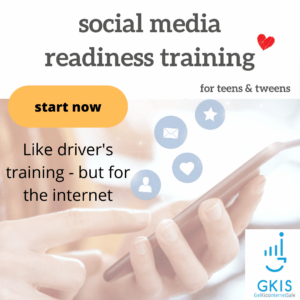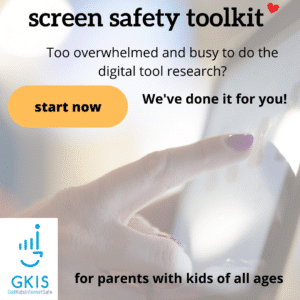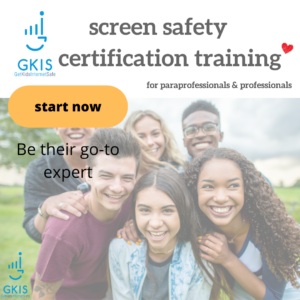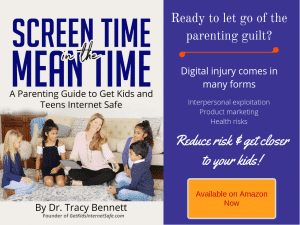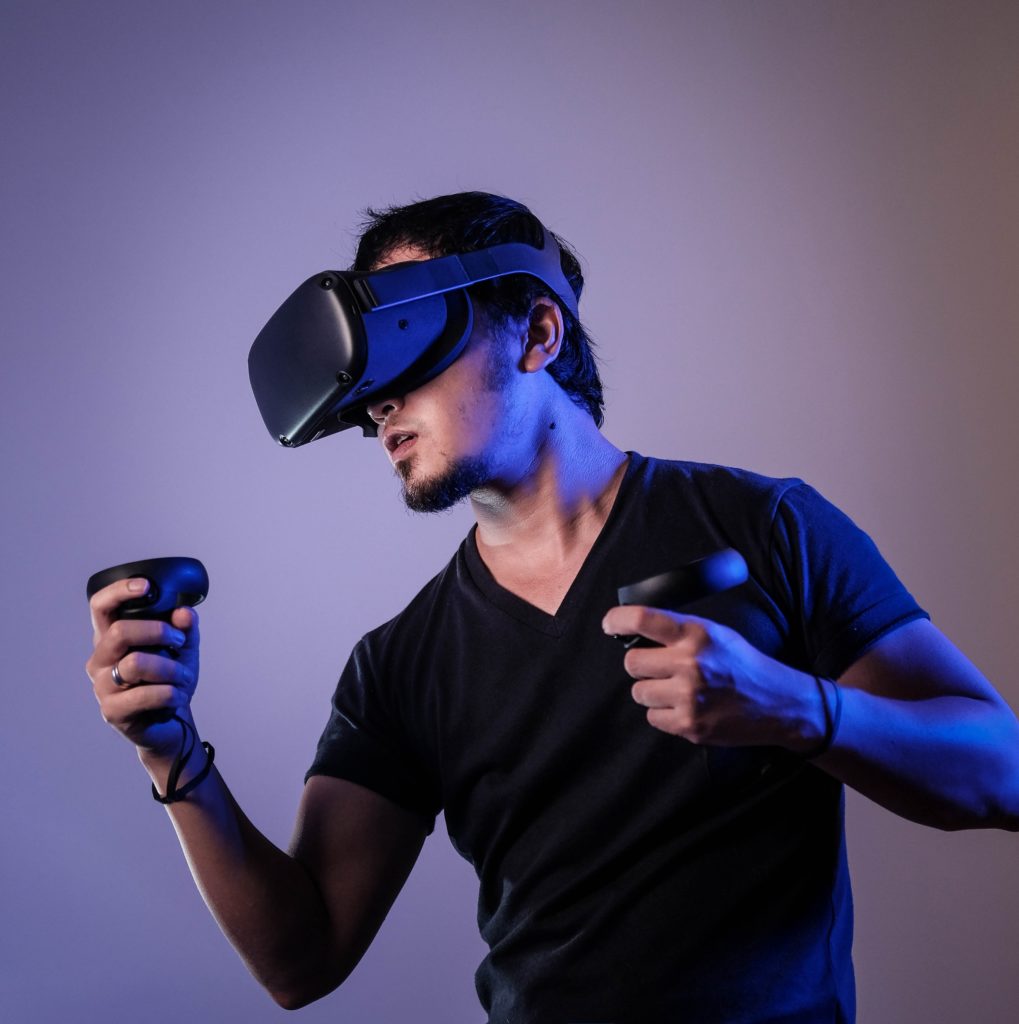
Virtual reality (VR) has become increasingly popular in the gaming community. VR allows consumers to experience new environments and activities that push the boundaries of creativity and possibility. Although VR offers excitement, studies have shown that the extended use of VR can lead to an uncomfortable mental health symptom called dissociation. Find out about VR-induced dissociation and the pros and cons of VR in today’s GKIS article. If you are worried about your kids’ extended use of VR gaming, our GKIS Screen Safety Essentials for the family offers weekly videos and downloads so you can achieve a peaceful fun home with healthy screen time. With 26 quick, fun lessons, our Essentials Course offers tons of ideas to keep you connected and safe. Keep reading to learn how to maintain your kids’ safety while giving them access to virtual fun.
What is virtual reality?
Virtual reality is gaming technology that simulates real or fantasy worlds that the players can immerse themselves into for a variety of activities. Immersion into the 3D VR world is possible by stimulating many senses all at once like vision, hearing, and touching.[1]
The Pros and Cons of VR Use
Pros
It’s fun and therapeutic!
VR can be really fun and exciting. It can serve as a mental break or escape from day-to-day routines and is a great way to connect with friends and meet new people with similar interests.
Access to new worlds and experiences can also be beneficial for those suffering from physical disabilities because they can experience activities that they cannot in the real world.
People with neurodevelopmental disabilities, like autism, can also benefit from VR. For example, an individual may use VR to learn how to better socialize in an environment where mistakes won’t lead to risks like in the real world. For example, as a behavioral intervention that works to help kids with autism, one of my patients has a goal of learning how to cross the street. Practicing in real life can be nerve-wracking and even dangerous due to the possibility of being hit by a car if my patient runs into the street from overstimulation. By practicing VR, he can eliminate risk as he learns to master this new skill.[2,3]
Work Training
VR also has potential benefits in the professional worl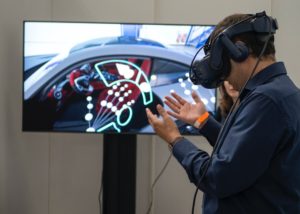
Cons
Feelings of Withdrawal and Disappointment with the Real World
For some people, what goes up must come down. Many players report feelings of sadness after play and a growing disappointment with real-life experiences. Tobias Schneider, a user of VR described feeling detached from the real world because it lacks the ‘magic’ and excitement VR has to offer. As an oculus user (a VR gaming system) myself, I recently went to their online forum and found that many users reported these feelings.[5]
Dissociation
Studies and forums have shown that VR has the potential risk of dissociation such as derealization and depersonalization. Derealization is this mental state where a person will feel so detached from their surroundings including people and objects, that the world will feel unreal. Depersonalization is this feeling that you are floating outside yourself. These types of dissociation occur for a variety of reasons, most typical in response to panic attacks and generalized anxiety. Theorists have described these symptoms as a defense that our bodies mobilize to protect us from stress. Other conditions that can cause dissociation include sensory deprivation, trauma, seizure disorders, dementia, and the use of hallucinogens or marijuana. Some people are even genetically prone to demonstrating this psychological symptom. Once a person dissociates once, they are more likely to dissociate again.
Although most people who dissociate describe it as a passing feeling, once one dissociates once they are more likely to do it again. For a minority of people, dissociation can occur often out of the blue in a condition called Depersonalization/Derealization Disorder.
A 2006 study examined the effects of VR use and found that for some players, episodes of dissociation increase after VR use. Even a gamer developer describes a time when they had to touch things around their surroundings after finishing a VR demo just to erase any lingering skepticism from her brain. If you look at the oculus forum, you will read many users complaining that their hands don’t feel like their own even after taking off the VR headset.[6,7,8,9]
Tips To Avoid the Negative Effects Of VR
- Read your VR system’s instruction manual and safety warnings.
- Start off with baby steps and play at a comfortable level that is not overwhelming.
- Take frequent breaks when using VR.
When To Seek Professional Help
Having feelings of depersonalization or derealization that occasionally pass is common and should not necessarily cause alarm. But if these feelings of depersonalization or derealization become persistent and severe, this can be a sign of a physical or mental health disorder. You should seek immediate help from a doctor if these feelings are:
- disturbing you or becoming disruptive to your emotional well-being,
- become persistent and seem to never go away or improve, or
- interfere with personal relationships, work, or other daily activities.
GKIS Resources That Can Help You Build Healthy Relationships with The VR World
GKIS Screen Safety Essentials Course
Want a peaceful, fun home with healthy screen time, but don’t want to spend on something that won’t work for? Check out our GKIS Screen Safety Essentials Course. We have a free two-week trial so you can determine if it’s the right resource for you before you spend a penny. Plus, it includes videos and downloads from all GKIS parent courses that are designed for weekly viewing, making the material digestible and easy.
GKIS Social Media Readiness training for teens & tweens
If you are not sure your child is ready to experience the online world check out our GKIS Social Media Readiness training. This self-paced course will get your kids ready for VR or anything in the online world. It includes mastery quizzes after each lesson to ensure they are prepared for online fun while maintaining safety. Guaranteed to make happy teens and relieved parents.
GKIS Online Safety Red Flags for Parents
Digital injury is real, and many users run to forums when trying to understand the negative feelings they experience from the overuse of technology. With our GKIS Online Safety Red Flags For Parents, parents will learn which behavioral red flags to look out for that may signal that their kid is suffering from digital injury.
Virtual reality is a hot topic. You can also check out our other GKIS articles to learn more about the benefits and risks VR has to offer:
Virtual Reality to Treat Phobias
“Metaverse” VR App Allows Sexual Exploitation of Minors

I’m the mom psychologist who will help you GetKidsInternetSafe.
Onward to More Awesome Parenting,
Tracy S. Bennett, Ph.D.
Mom, Clinical Psychologist, CSUCI Adjunct Faculty
GetKidsInternetSafe.com
Works Cited
[1] Bardi, J. (2019) What Is Virtual Reality: Definitions, Devices, and Examples.3D Cloud Marxent. https://www.marxentlabs.com/what-is-virtual-reality/
[2] Arrango, B. (2022) Pros and Cons of Virtual Reality. Filmora.Pros and Cons of Virtual Reality[2021] (wondershare.com) [3] Mileva, G. (2022) 7 Benefits of AR and VR For People With Disability. ARPost. 7 Benefits Of AR And VR For People With Disability| ARPost
[4]Dannewitz, M. (2020) Virtual Reality: A Valuable Tool for Health Care Training. Motive.ioVirtual Reality: A Valuable Toolfor Healthcare Training Motive.io [5] Searles, R. (2016) Virtual Reality Can Leave You With an Existential Hangover. The Atlantic.https://www.theatlantic.com/technology/archive/2016/12/post-vr-sadness/511232/ [6] Forrester, J. (2020) Oculus Community: Forums. https://forums.oculusvr.com/t5/General/Feels-like-I-m-in-VR-even-though-I-am-not/td-p/839398 [7] Kiefaber, D. (2017). Using Virtual Reality Could Lead to Feelings of Detachment, Sadness. Inside Hook. https://www.insidehook.com/article/health-and-fitness/virtual-reality-leads-feelings-detachment-sadness [8] Cleveland Clinic. (2020) Depersonalization/Derealization Disorder. Cleveland Clinic. https://my.clevelandclinic.org/health/diseases/9791-depersonalizationderealization-disorder [9] Mayo Clinic. (n.d.) Depersonalization-derealization disorder. https://www.mayoclinic.org/diseases-conditions/depersonalization-derealization-disorder/symptoms-causes/syc-20352911Photo Credits
Photo by Pham, Minh. (https://unsplash.com/photos/HI6gy-p-WBI)
Photo by Expo, Xr. (https://unsplash.com/photos/ipDhOQ5gtEk)



